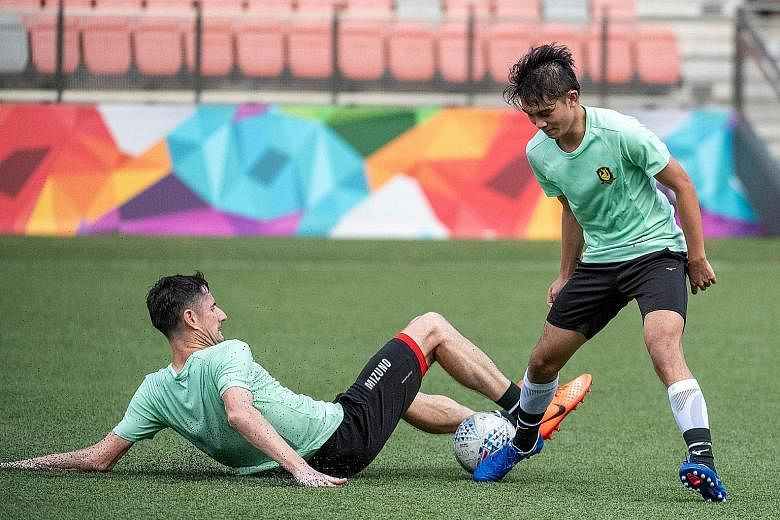For the past six weeks, Singapore Premier League (SPL) footballers have diligently trained day in, day out, even as a question mark hovers over whether they will play another competitive game this year.
The league, which began on Feb 29, was halted on March 24 due to the pandemic. Teams returned to training - albeit in groups of five and with no contact allowed - in Phase Two from June 20 and with the Government slowly easing measures in place to control the spread of the coronavirus, there is growing hope that the SPL can resume soon.
Tanjong Pagar United defender Delwinder Singh said it would be a "big morale booster" not just for football. "At the end of the day, everyone wants to be able to go back to the way it was before without restrictions," he added.
Athletes' hopes have been raised with the gradual easing of restrictions in other sectors of society.
From tomorrow, 12 religious organisations will be allowed to hold worship services with up to 100 people at a time, double the current limit of 50. The number of attendees at weddings (up to 50 from 20) and funerals (up to 30 from 20) have also been increased in recent days. Another positive sign is that community cases have remained low in recent weeks.
Singh, 28, stressed that a cautious approach was important, citing how Vietnam resumed its domestic football league with no limits on fans in stadiums, only to suspend it a second time after a spike in cases.
While Dr Leong Hoe Nam, infectious disease expert at Mount Elizabeth Novena Hospital, would prefer to restart sports leagues and competitions when there are zero unlinked community cases consistently for one to two weeks, he suggested any move to resume play first be done behind closed doors before progressing to quarter-and half-full arenas while ensuring necessary safe management measures.
For Tampines Rovers head coach Gavin Lee, small, gradual steps are key. He said: "The next thing will be training in larger groups before full team training and then competitive games."
Other sports here are equally hopeful. Netball Singapore chief executive officer Cyrus Medora believes his association can stage its eight-division National League, which is scheduled for Sept 14-Nov 21, and has laid the groundwork for the competition to take place.
"Based on speculation, maybe (the authorities) will relax the restrictions a bit more by mid-August, and hopefully, by September, they will allow court play to start," he said.
Not all sports associations are as optimistic though. Singapore Floorball Association president Kenneth Ho has already braced himself for a blank 2020 calendar. He said: "Safety of the players and fans are of utmost importance and if we can't guarantee (that), we may have to bite the bullet and go without any competitions."
Professor Teo Yik Ying, dean of the National University of Singapore's Saw Swee Hock School of Public Health, felt returning to competitive sport was "another concrete step towards normalcy" and "these events cannot be halted indefinitely". But he stressed "there is no single rule that generalises to every sporting event, and specific considerations may be required for different sports and for different categories of events (training versus competitions)".
As for Covid-19 testing, Dr Leong suggested this be done every two weeks and ideally timed one day before the match while Prof Teo raised the question of costs.
"Clearly if this can be borne by the athletes, federations or sponsors, then undertaking regular and routine testing of the athletes will be a good approach," said Prof Teo. "I do not otherwise think it is appropriate to rely on public funding to pay for the costs of these tests."
Ultimately how well Singapore moves back into normalcy, he said, depends on the country's general approach.
"The question is not about the physical contact between players - after all we allow groups of five to come together for a meal and I think it is debatable whether contact sports is necessarily at a higher risk than five people spending an extended time speaking and eating together in fairly close proximity," Prof Teo noted. "What is important is how to minimise the chance that athletes participating in these contact sports are infected and will go on to infect other competitors.
"This thus comes back to the overall strategy a country has regarding the ability to track down infected people, active and comprehensive contact tracing, as well as to isolate and quarantine exposed contacts early. If the overall strategy can be implemented and executed well, then we already minimise the risk that anyone participating in contact sports may be infected, and this as a whole keeps the overall sporting community safe."

